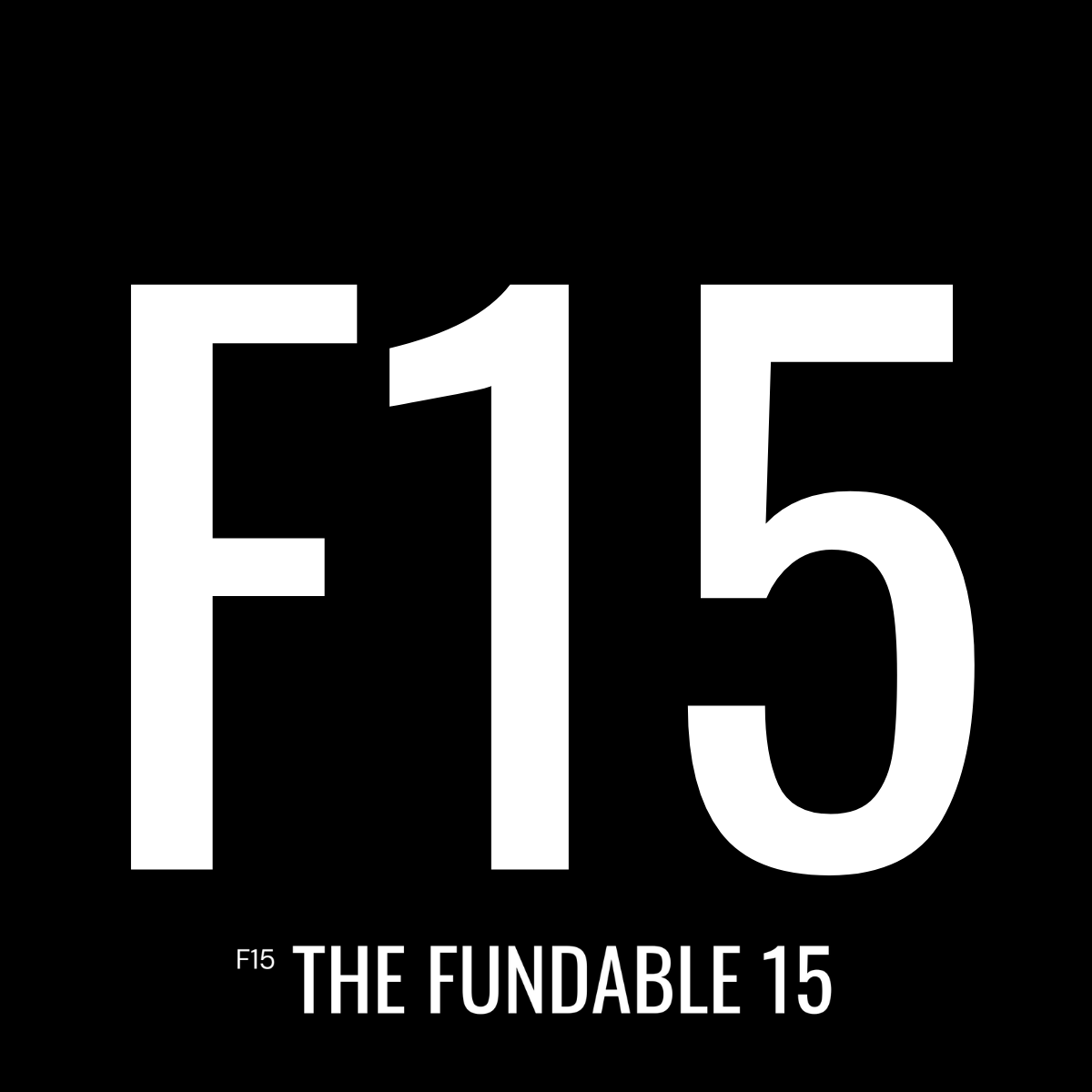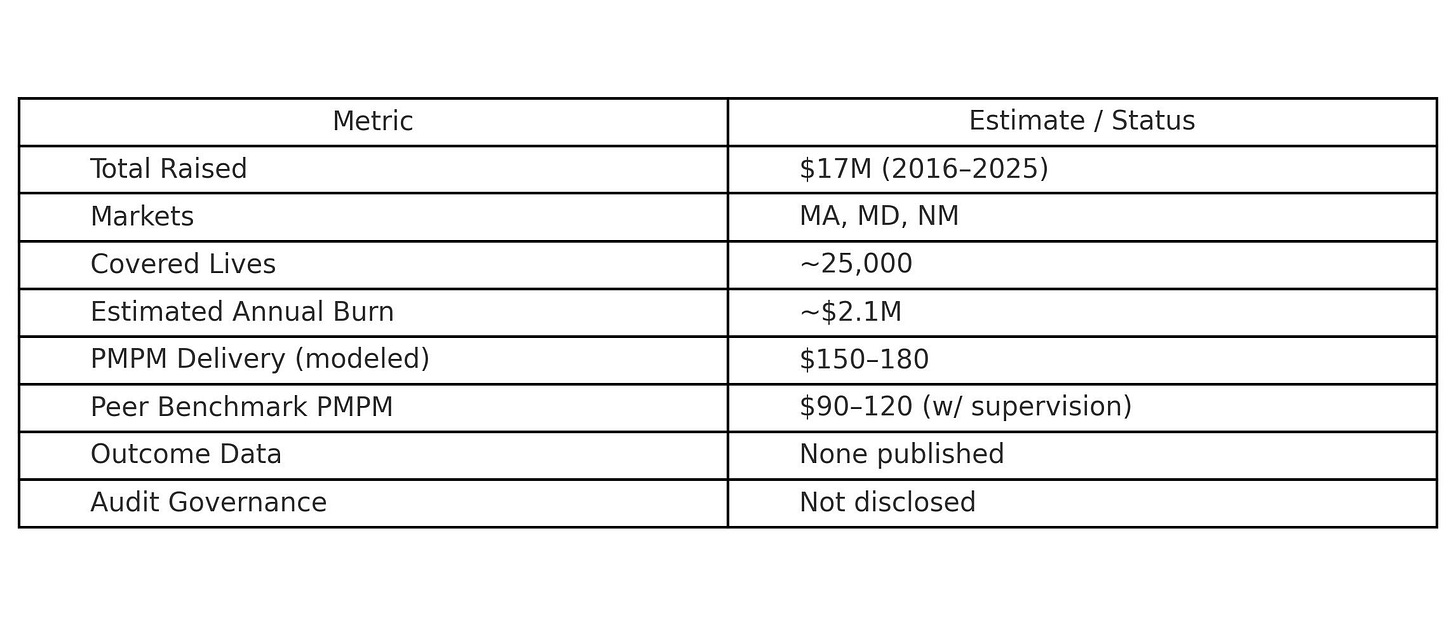While the healthcare world celebrates Stars-linked platforms and generative AI for behavioral triage, someone still has to answer a simpler question:
Can peer support actually scale without compromising trust or blowing up margin?
Everyone’s selling human connection at scale. But scaling peer care requires more than good UX and case studies. It requires audit readiness, economic durability, and proof that members will keep showing up when the conversation is machine-scanned.
Today, we’re looking at Marigold Health, a company that’s spent nearly a decade trying to thread the needle between Medicaid-aligned peer support and NLP-powered behavioral risk escalation.
This is #F15
You’re reading a Fundable 15 Black Brief, my weekly drop on the most fundable, ROI-clear social care orgs flying under the radar.
Built for MA execs, funders, strategists, and M&A leads who know what Stars volatility feels like on a Monday.
This is Part 3 of 3 in our current series:
The New Infrastructure of Care
Part 1: Solace Health ✓ (Medicare onboarding + Stars retention)
Part 2: Wayspring ✓ (Delegated SUD infrastructure)
Part 3: Marigold Health (Peer ops + NLP escalation logic)
What They Actually Do
Marigold Health offers chat-based peer support, augmented by a natural language processing (NLP) engine that flags behavioral risks in real time. The system routes alerts to clinical supervisors for review.
The idea: scale peer engagement while reducing the supervisory overhead needed to keep it safe, effective, and auditable.
👉🏽 Peer-led, HIPAA-compliant group chat
👉🏽 NLP risk scoring layered over text data
👉🏽 Contracts in MA, MD, NM (Medicaid + DSNP)
👉🏽 ~$17M raised since 2016
👉🏽 ~25,000 covered lives
The Intel
Why This Matters Now
CMS 2026 will demand documented audit trails for AI-enhanced decision systems. Any platform triggering care escalation (like Marigold’s NLP model) must be able to show:
Escalation logic
Override tracking
Stars-linked attribution
Marigold has not publicly disclosed audit governance, override logic, or Stars attribution methodology. This absence limits what external evaluators can underwrite in terms of CMS 2026 readiness or Stars-aligned valuation.
The Embedded Tension:
Peer support works because it feels safe.
Marigold’s product thesis is built on a tightrope:
On one side: Peer support works when people feel emotionally safe. That safety hinges on trust, confidentiality, and non-clinical tone.
On the other side: CMS 2026 audit protocols demand transparency, documentation, override tracking, and the ability to defend decisions that influence care.
Plans, vendors, and state programs will need to demonstrate:What the model does
How it escalates
Who can override
Whether outcomes improve
This creates a fundamental tension:
The very moment peer support becomes auditable, it may become less trusted.
But if it isn’t auditable, it won’t be fundable or contractable under Stars-linked procurement.
To date, Marigold (like many in this space) has not publicly resolved this tension, as no override audits, escalation logic, or outcome attribution have been disclosed. If those elements remain undocumented beyond the sales deck, the market can’t underwrite them financially or operationally in this new reality.
The Data
Marigold’s PMPM is modeled at $150–180 (Full modeling breakdown below)
Resulting PMPM range: $150–180, assuming conservative member-to-peer ratios, intensive QA on NLP outputs, and moderate underutilization. In leaner staffing conditions, this could drop to ~$120 PMPM but current signals suggest a higher-cost baseline.
That means it is:
30–60% higher than peer support industry benchmarks
With no public Stars or FUH/FUM attribution
And no documented audit readiness to de-risk the NLP layer
Takeaway:
Marigold’s modeled PMPM is 20–50% above comparable programs. Unless Stars impact, cost offset, or trust-based retention can be demonstrated, the model exceeds payer tolerance in Medicaid and MA markets.
The Investment Thesis
The Bull Case
CMS accepts NLP logic + override process in audit protocols
NLP reduces supervisory costs enough to normalize PMPM
Stars impact validated, and buyers embed Marigold in care ops stack
The Bear Case
Stars impact remains anecdotal
NLP logic lacks transparency → flagged in CMS audits
Member trust erodes as escalations increase
2026 procurement cycle passes without compliance milestones met
The Fundable Verdict
Status: Not fundable. Possibly acquirable.
The value here is:
Peer ops workflows
MCO contracts
Field-tested product-market fit in tough segments
But not the tech.
Strategic Value
Buyers with audit-ready Stars infrastructure could extract:
Contracts
Ops team
Medicaid trust capital
…and sunset the NLP stack entirely.
Estimated acquisition range: $5M–$12M
Based on contract durability, margin potential, and ops quality, not IP.
Strategic Buyers
The buyers best suited for Marigold are the ones looking for audit-ready behavioral infrastructure that supports Stars performance, while already having clinical capacity and compliance infrastructure. What they’re missing is a scalable, trusted peer ops layer. Buyers like Devoted, CareBridge, Unite Us, Cityblock, SCAN, and PE platforms building Stars-aligned wraparound services make sense because they can absorb the contracts, fold in the workforce, and drop the tech stack.
Who doesn’t make sense: Tech-first startups, Series A growth plays, or innovation labs looking for differentiated IP.
The Quiet Move
Don’t buy it. Test it.
Pilot the NLP in a no-risk setting. Measure:
Alert frequency
Override rate
FUH/FUM movement
Member trust after escalation
If it works, negotiate for the team + contracts.
If not, pass cleanly.
What to Watch
Expansion Signals
CMS eval or Stars-linked outcome release
Override audit logic disclosed
MA plan renewals or new DSNP launches
Red Flags
Delay in audit logic publication
Contract attrition in current states
Leadership gaps in compliance, product, or payer engagement
The Bottom Line
Marigold is a real operator in a real space. But peer support + NLP still hasn’t proven it can move Stars metrics at scale without compliance friction or trust decay.
Verdict: Watchlist only.
Acquire the ops if you must. Retire the tech if you do.
Tips or signals: christina@christinar.media
Full PMPM breakdown of Marigold Health including staffing ratios, NLP QA costs, and margin risk zones below:
Estimated PMPM Cost Modeling Breakdown: Marigold Health
Estimated delivery cost of NLP-supported peer support services based on public info and industry benchmarks
Keep reading with a 7-day free trial
Subscribe to The Fundable 15 to keep reading this post and get 7 days of free access to the full post archives.





